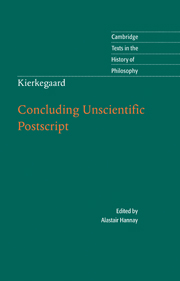Book contents
- Frontmatter
- Contents
- Introduction
- Chronology
- Further reading
- Note on the translation
- CONCLUDING UNSCIENTIFIC POSTSCRIPT TO THE PHILOSOPHICAL CRUMBS
- Preface
- Contents
- Introduction
- Part One The objective problem of Christianity's truth
- Part Two The subjective problem. The subject's relation to the truth of Christianity, or what it is to become a Christian
- 5 Conclusion
- Appendix: Understanding with the reader
- A first and last declaration by S. Kierkegaard
- Index
- Cambridge Texts in the History of Philosophy
Preface
Published online by Cambridge University Press: 26 February 2010
- Frontmatter
- Contents
- Introduction
- Chronology
- Further reading
- Note on the translation
- CONCLUDING UNSCIENTIFIC POSTSCRIPT TO THE PHILOSOPHICAL CRUMBS
- Preface
- Contents
- Introduction
- Part One The objective problem of Christianity's truth
- Part Two The subjective problem. The subject's relation to the truth of Christianity, or what it is to become a Christian
- 5 Conclusion
- Appendix: Understanding with the reader
- A first and last declaration by S. Kierkegaard
- Index
- Cambridge Texts in the History of Philosophy
Summary
Fate may seldom have so favoured a literary undertaking in accordance with its author's wishes as my Philosophical Crumbs. In doubt and unforthcoming as I am in all matters of personal opinion and self-appraisal, there is one truth I may confidently assert concerning the fate of that little piece: it has caused no sensation, none whatever. Undisturbed, and in accordance with his own motto (‘Better well hanged than ill wed’), the hanged, yes, well-hanged author has been left hanging. No one has asked him, not even playfully and in jest, exactly for whom he was hanging. But that was the wish: better well hanged, yes, better that than by an unfortunate marriage brought into systematic affinity with all the world. Relying on the manner of the piece's composition, my hope was that it would turn out like this. But in light of the agitated ferment of the times, in light of the constant warnings of prophets, visionaries and speculators, I feared I might see my wish confounded through some mistake. It is always awkward, even for the most insignificant traveller, to arrive at a town just when, in a state of the highest but most diverse expectation – some with cannons drawn up and fuses lit, with fireworks and illuminated placards in readiness, some with the town hall ceremoniously decorated, reception committee booted, speakers prepared, some with urgent systematic pen dripping and notebook opened – everyone is awaiting the arrival incognito of the promised one.
- Type
- Chapter
- Information
- Kierkegaard: Concluding Unscientific Postscript , pp. 3 - 6Publisher: Cambridge University PressPrint publication year: 2009

